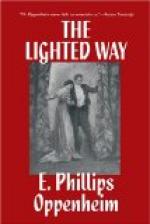Sabatini pushed away his chair and prepared to leave. His hand fell carelessly and yet almost affectionately upon the young man’s shoulder.
“Perhaps,” he said, quietly, “I am what you are doubtless thinking me—something of a poseur. Perhaps I do like making a tax upon your sober British rectitude. I will admit that the spirit of adventure is in my heart; I will admit that there is in my blood the desire to take from him who hath and give to him who hath not; but, on the other hand, I have my standards, and I seriously do not think that you would be risking very much if you accepted my invitation to lunch to-day.”
Arnold held out his hand.
“If I hesitate for a single moment,” he replied frankly, “it is because of my work here. However, as you say that Mrs. Weatherley will be there, I will come.”
“We shall look forward to the pleasure, then,” Sabatini concluded. “Now I will leave you to go on with your money-coining. Au revoir!”
He strolled gracefully out, pausing on his way through the clerk’s office to offer a courteous farewell to Mr. Jarvis. The great automobile glided away. Arnold came back from the window and sat down in front of his desk. Before his eyes was a pile of invoices, in his brain a strange medley of facts and fancies.
Mr. Jarvis came bustling in.
“About those Canadian hams, Chetwode,” he began,—
Arnold recognized the voice of his saviour.
“We’ll go into the matter at once,” he declared, briskly.
CHAPTER XXXI
A LUNCHEON-PARTY
It seemed to Arnold that he had passed, indeed, into a different world as he followed Count Sabatini’s austere looking butler across the white stone hall into the cool dining-room, where the little party which he had come to join was already at luncheon. Outside, an unexpected heat seemed to have baked the streets and drained the very life from the air. Here the blinds were closely drawn; the great height of the room with its plain, faultless decorations, its piles of sweet-smelling flowers, and the faint breeze that came through the Venetian blinds, made it like a little oasis of coolness and repose. The luncheon-party consisted of four people—Count Sabatini himself, Lady Blennington, Fenella, and a young man whom Arnold had seen once before, attached to one of the Legations. Fenella held out both her hands.
“I’m afraid I am late,” Arnold said.
“It is my fault for not mentioning the hour,” Sabatini interposed. “We are continental in our tastes and we like to breakfast early.”
“In any case, you would be forgiven,” Fenella declared, “for this, as you know, is our party of reconciliation.”
“What, have you two been quarreling?” Lady Blennington exclaimed. “You don’t deserve to have admirers, Fenella. You always treat them badly. How is it you’ve never been to see me, Mr. Chetwode?”




